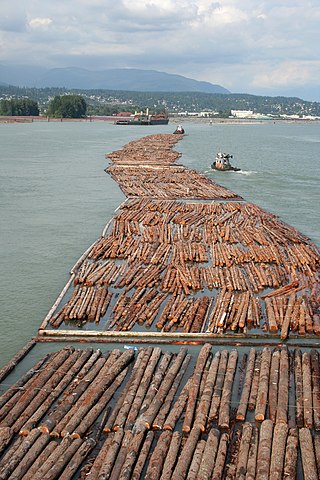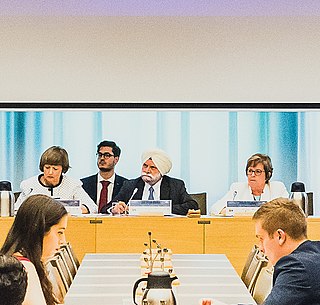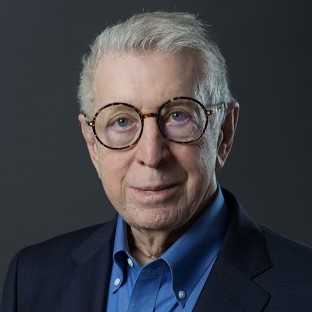
The World Trade Organization (WTO) is an intergovernmental organization headquartered in Geneva, Switzerland that regulates and facilitates international trade. Governments use the organization to establish, revise, and enforce the rules that govern international trade in cooperation with the United Nations System. The WTO is the world's largest international economic organization, with 164 member states representing over 98% of global trade and global GDP.

The Permanent Court of Arbitration (PCA) is a non-UN intergovernmental organization headquartered at the Peace Palace, in The Hague, Netherlands. Unlike a judicial court in the traditional sense, the PCA provides administrative support in international arbitrations involving various combinations of States, State entities, international organizations and private parties. The cases span a range of legal issues involving territorial and maritime boundaries, sovereignty, human rights, international investment, and international and regional trade. The PCA is constituted through two separate multilateral conventions with a combined membership of 122 Contracting Parties. The PCA is not a United Nations agency, but has been a United Nations observer since 1993.

The Canada–U.S. softwood lumber dispute is one of the largest and most enduring trade disputes between both nations. This conflict arose in 1982 and its effects are still seen today. British Columbia, the major Canadian exporter of softwood lumber to the United States, was most affected, reporting losses of 9,494 direct and indirect jobs between 2004 and 2009.
The Dispute Settlement Body (DSB) of the World Trade Organization (WTO) makes decisions on trade disputes between governments that are adjudicated by the Organization. Its decisions generally match those of the Dispute Panel.

A trade war is an economic conflict often resulting from extreme protectionism in which states raise or create tariffs or other trade barriers against each other in response to trade barriers created by the other party. If tariffs are the exclusive mechanism, then such conflicts are known as customs wars, toll wars, or tariff wars; as a reprisal, the latter state may also increase the tariffs. Trade war arises only if the competitive protection between states is of the same type and it is not valid in case of dumping exports. Increased protection causes both nations' output compositions to move towards their autarky position. Minor trade disagreements are often called trade disputes when the war metaphor is hyperbolic.

James Leonard Bacchus is an American lawyer, businessman, and politician who served as a member of the U.S. House of Representatives from Florida from 1991 to 1995. He was a founding member and twice chairman of the Appellate Body of the World Trade Organization in Geneva, Switzerland from 1995 to 2003. He later became a fellow of the European Institute for International Law and International Relations.

In contract law, an arbitration clause is a clause in a contract that requires the parties to resolve their disputes through an arbitration process. Although such a clause may or may not specify that arbitration occur within a specific jurisdiction, it always binds the parties to a type of resolution outside the courts, and is therefore considered a kind of forum selection clause.
The Agreement on the Application of Sanitary and Phytosanitary Measures, also known as the SPS Agreement or just SPS, is an international treaty of the World Trade Organization (WTO). It was negotiated during the Uruguay Round of the General Agreement on Tariffs and Trade (GATT), and entered into force with the establishment of the WTO at the beginning of 1995. Broadly, the sanitary and phytosanitary ("SPS") measures covered by the agreement are those aimed at the protection of human, animal or plant life or health from certain risks.

Arbitration is a formal method of dispute resolution involving a neutral third party who makes a binding decision. The third party neutral render the decision in the form of an 'arbitration award'. An arbitration decision or award is legally binding on both sides and enforceable in the courts, unless all parties stipulate that the arbitration process and decision are non-binding.

An arbitral tribunal or arbitration tribunal, also arbitration commission, arbitration committee or arbitration council is a panel of unbiased adjudicators which is convened and sits to resolve a dispute by way of arbitration. The tribunal may consist of a sole arbitrator, or there may be two or more arbitrators, which might include a chairperson or an umpire. Members selected to serve on an arbitration panel are typically professionals with expertise in both law and in friendly dispute resolution (mediation). Some scholars have suggested that the ideal composition of an arbitration commission should include at least also one professional in the field of the disputed situation, in cases that involve questions of asset or damages valuation for instance an economist.
Dispute settlement or dispute settlement system (DSS) is regarded by the World Trade Organization (WTO) as the central pillar of the multilateral trading system, and as the organization's "unique contribution to the stability of the global economy". A dispute arises when one member country adopts a trade policy measure or takes some action that one or more fellow members consider to be a breach of WTO agreements or to be a failure to live up to obligations. By joining the WTO, member countries have agreed that if they believe fellow members are in violation of trade rules, they will use the multilateral system of settling disputes instead of taking action unilaterally — this entails abiding by agreed procedures—Dispute Settlement Understanding—and respecting judgments, primarily of the Dispute Settlement Board (DSB), the WTO organ responsible for adjudication of disputes.
The beef hormone controversy or beef hormone dispute is one of the most intractable agricultural trade controversies since the establishment of the World Trade Organization (WTO).

Jennifer Anne Hillman is a professor of practice at Georgetown University Law Center. As of 2016 she was working on trade litigation for Cassidy Kent.
Investor–state dispute settlement (ISDS), or an investment court system (ICS), is a set of rules through which countries can be sued by foreign investors for certain state actions affecting the investments (FDI) of that investor by that state. This most often takes the form of international arbitration between the foreign investor and nation. For the rules to be effective, they must have been agreed upon between the states concerned.
In the 1990s, a trade dispute over fresh salmon arose between the Commonwealth nations of Canada and Australia. In 1995, Canada made a complaint to the World Trade Organization, of which both countries are members, about Australia's restriction on imports of fresh salmon, which were part of a quarantine measure for health purposes.
The US-Mexico Trade Dispute - Stainless Steel Sheets and Coils dumping is a trade dispute between the governments of The United States and Mexico. On May 26, 2006 Mexico requested consultations with the United States about a number of final anti-dumping judgments made by the US Department of Commerce. The judgments concerned the imports of stainless steel sheets and strips from Mexico, which were supposedly illegal dumping through the use of a "Zeroing" technique by the US Department of Commerce. Mexico believed that some of the laws, regulations, administrative practices and methodologies implemented by the US impaired and nullified the benefits added to Mexico, directly or indirectly, under the World Trade Organization Agreement on Customs Valuation, and that the anti-dumping laws were unwarranted. The consultations were held to discuss activities carried on between January 1999 and June 2004. This led to a panel being established in December 2006, the proceedings of which continued until May 2013, with a mutually agreeable solution being reached. Japan asked to join the consultation in June 2006.
Peter van den Bossche is a professor of international economic law at the University of Bern. In 2018 he was elected president of the Society of International Economic Law (SIEL). He served as a judge on the Appellate Body of the World Trade Organization (WTO) from 2009-2017, following nomination by the European Union and appointment and re-appointment by the Member states of the World Trade Organization. In December 2013 his appointment was renewed. With the end of his formal appointment at the end of 2017, US-driven delays in appointing his replacement alongside US blocking of other key WTO vacancies has meant a growing crisis for the WTO-based multilateral trading system. The election of van den Bossche as SIEL president is considered by some a sign of both defiance to economic nationalism and support for the rules-based multilateral system.

Hélène Ruiz Fabri is a French jurist and Professor of Law. She was a Director of the Max Planck Institute Luxembourg for Procedural Law until it got closed.

Luiz Olavo Baptista was a Brazilian jurist, lawyer, arbitrator, and International Law professor. Among other positions, he acted as President of the Appellate Body of the World Trade Organization, of which he was a member between 2001 and 2008.
Joost Pauwelyn is a Belgian professor of international economic law at the Graduate Institute of International and Development Studies, in Geneva, Switzerland, and co-director of the institute's Centre for Trade and Economic Integration. He is an expert in World Trade Organization law. He was Murase Visiting professor of law at Georgetown University Law Center in the United States from 2014 to 2021.
 China, 1 December 2016 — 30 November 2020
China, 1 December 2016 — 30 November 2020 South Korea, 2016 — 2017
South Korea, 2016 — 2017 Mauritius, 2014 — 2018
Mauritius, 2014 — 2018 South Korea, 2012 — 2016
South Korea, 2012 — 2016 United States, 2011 — 2015 & 2015 — 2019
United States, 2011 — 2015 & 2015 — 2019 India, 2011 — 2015 & 2015 — 2019
India, 2011 — 2015 & 2015 — 2019 Belgium, 2009 — 2013 & 2013 — 2017
Belgium, 2009 — 2013 & 2013 — 2017 Mexico, 2009 — 2013 & 2013 — 2017
Mexico, 2009 — 2013 & 2013 — 2017 China, 2008 — 2012 & 2012 — 2016
China, 2008 — 2012 & 2012 — 2016 Japan, 2008 — 2012
Japan, 2008 — 2012 Philippines, 2007 — 2011
Philippines, 2007 — 2011 United States, 2007 — 2011
United States, 2007 — 2011 South Africa, 2006 — 2009 & 2009 — 2013
South Africa, 2006 — 2009 & 2009 — 2013 United States, 2003 — 2007
United States, 2003 — 2007 Brazil, 2001 — 2005 & 2005 — 2009
Brazil, 2001 — 2005 & 2005 — 2009 Italy, 2001 — 2005 & 2005 — 2009
Italy, 2001 — 2005 & 2005 — 2009 Australia, 2001 — 2005 & 2005 — 2006
Australia, 2001 — 2005 & 2005 — 2006 India, 2000 — 2004 & 2004 — 2008
India, 2000 — 2004 & 2004 — 2008 Egypt, 2000 — 2004 & 2004 — 2008
Egypt, 2000 — 2004 & 2004 — 2008 Japan, 2000 — 2003 & 2003 — 2007
Japan, 2000 — 2003 & 2003 — 2007 United States, 1995 — 1999 & 1999 — 2003
United States, 1995 — 1999 & 1999 — 2003 Germany, 1995 — 1997 & 1997 — 2001
Germany, 1995 — 1997 & 1997 — 2001 Uruguay, 1995 — 1997 & 1997 — 2001
Uruguay, 1995 — 1997 & 1997 — 2001 Philippines, 1995 — 1997 & 1997 — 2001
Philippines, 1995 — 1997 & 1997 — 2001 New Zealand, 1995 — 1999 & 1999 — 2000
New Zealand, 1995 — 1999 & 1999 — 2000 Egypt, 1995 — 1999 & 1999 — 2000
Egypt, 1995 — 1999 & 1999 — 2000 Japan, 1995 — 1999 & 1999 — 2000
Japan, 1995 — 1999 & 1999 — 2000







